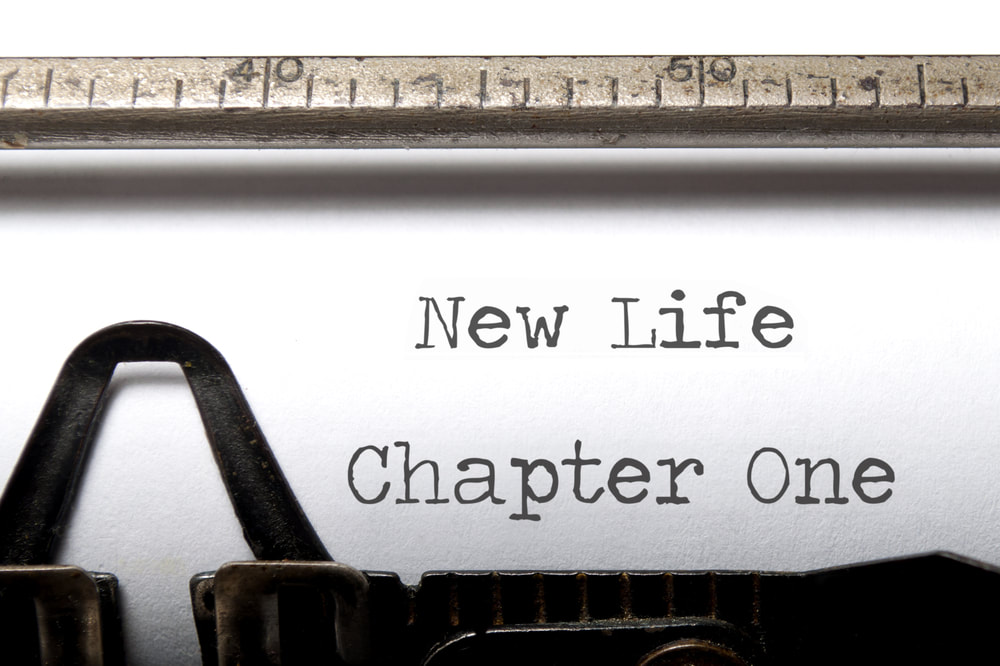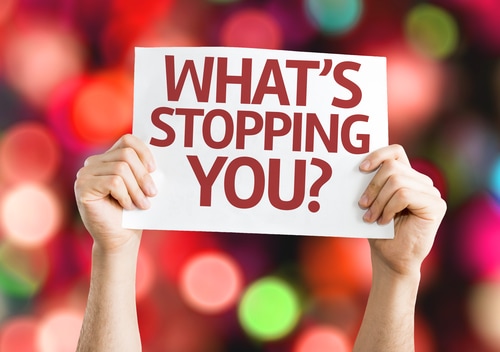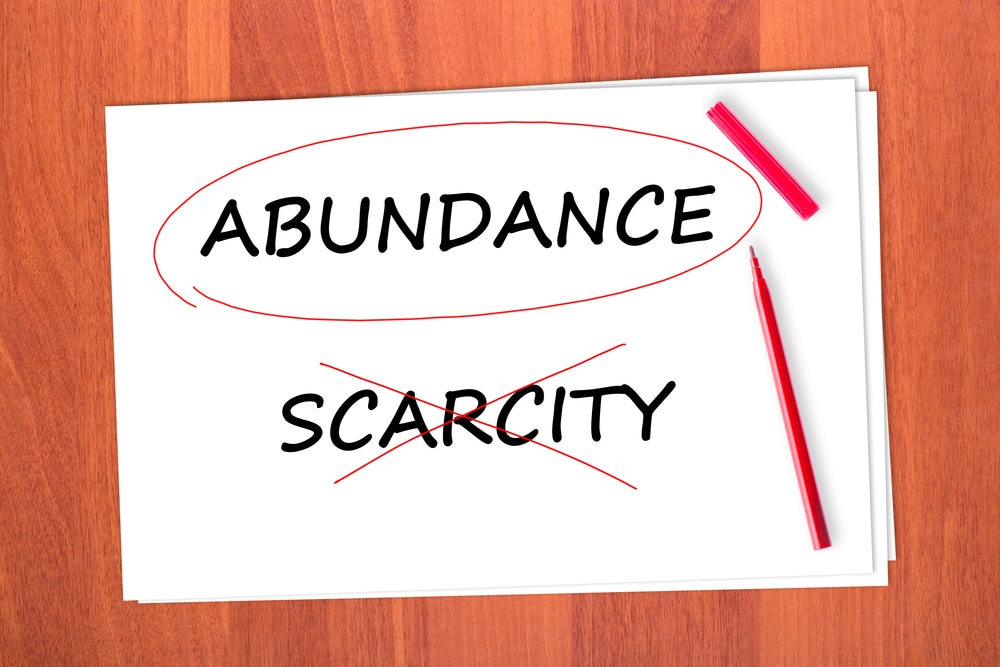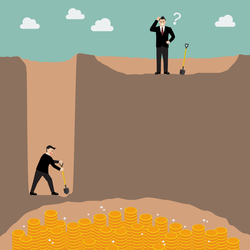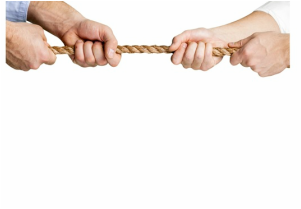Many of us are wondering how best to tend to our mental health whist we are hunkering down, waiting for the global, category five hurricane to pass. Aside from adhering to personal hygiene and social distancing protocols, there is little more we can do to curb spread of COVID-19. Virulent panic, however, is a different story. In this article we will explore fear’s true purpose, the problems we are likely to encounter when we become overly attentive to fear (i.e., panic), and what we can do to step out of fear once it has fulfilled its purpose. Healthy fear is meant to wake us from denial and get us to take action. Without fear, it is likely we would still be rubbing dirty hands all over our faces and gathering in public spaces. When we listen to fear and respond accordingly, fear has done its job. After that, the healthiest thing to do is let it go. Continuing to ruminate about things beyond our control is a one-way ticket to panic which, like fear, also has a specific purpose. Eons ago, it was panic that alerted us to clear and imminent danger. It prompted us to run, fight, or flee to avoid being eaten by predators or killed off by neighboring tribes. Today, panic is helpful in so far as it protects us from danger that is happening in the present moment: the smoke alarm sounds and we quickly exit the building. Beyond that, panic is pretty much useless. In states of prolonged stress, the brain can get stuck in panic mode. When the smoke alarm routinely sounds, it becomes difficult to distinguish a false alarm from a real fire. What’s more, primal fear can manifest as a state of impending doom, about which we must do something, even when there is nothing more to do. In panic mode, our thoughts and actions will organize themselves around two themes: life (i.e, food, sex, and toileting) and death. Additionally, primal fear incites irrational competitiveness. Plentiful goods (read: toilet paper) suddenly appear to be in short supply. So we overbuy, all but guaranteeing the very scarcity we fear most. I suspect this to be the reason that supermarket shelves are empty. We are worried there will not be enough for everyone so we make sure there isn’t enough for anyone. Sound smart to you? Me neither. Like most primitive instincts, panic is neither discerning nor sophisticated. Okay. Now we know about panic and the understandable (but not so helpful) compulsive behaviors that come with it. It’s time to talk about what we can do to turn off the panic switch. Here are a few things to try:
Remember pandemics are both temporary and survivable. While it true (and sad) that some will not outlive COVID-19, it is also true that the vast majority of us will. The pandemic will end eventually. When it does, just as our foremothers and fathers did in 1919, we too will rebuild. In the meantime, we must choose wisely when and how we engage with fear. If you are following personal hygiene and social distancing guidelines, then fear has already served its purpose. It’s okay to let it go. Dr. Jill Gross is a licensed psychologist, therapist, and counselor. She offers grief therapy, divorce consultation, co-parenting support, and other counseling services in the Phinney Greenwood area of Seattle, WA. Stuck in panic mode? Schedule a free phone consultation to find out how counseling can help you go from panic to peace.
0 Comments
On the cusp of a breakup, separation, or divorce, it is common for people to focus mostly on what they will lose: a spouse or partner, time with their children, relationships with the ex's family and friends. The list goes on and on. As a separation and divorce counselor, I like to help clients honor the pain of loss while reminding them of what will also be gained: relief from the tension of a relationship that wasn't working, the confidence of knowing they can thrive on their own, new experiences with people they've yet to meet. This list, too, can go on and on. When the basic business of just getting by (e.g., getting out of bed, taking a shower, going to work, etc.) seems herculean, it's hard to trust that the future will be bright. But, with a little mindfulness, some time, and some effort, it is possible to thrive after a breakup, separation, or divorce. If you are in the pain trenches of acute loss, here are a few tips to help guide you toward a brighter future:
Even if you don’t believe it right now (which is okay), you are heading toward wherever you are meant to go. What if this ending is an invitation to feel as whole as you already are? Dr. Jill Gross is a licensed psychologist, therapist, and counselor. She offers grief therapy, divorce consultation, co-parenting support, and other counseling services in the Phinney Greenwood area of Seattle, WA. If you would like support in finding the forward path, schedule a free consultation to see how divorce counseling can help. Counselors and therapists once conceptualized grief as a linear process. It was meant to unfold in predictable stages: denial, followed by anger, bargaining, depression and, finally, acceptance. We used to think grief had a beginning, a middle, and an end. Grief experts think differently now. The grief model has considerably expanded over the last decade. While the above described experiences depict what many grievers encounter after a loss, we now know that the "areas" of grief are neither linear nor universal. What's more, grief has proven itself to be cyclical, free-flowing, and without an endpoint. Though our understanding of the grieving process has evolved, many of the grievers I see in therapy judge themselves harshly when their grief does not look or feel the way they think it should. They should feel more of this or less of that. They admonish themselves for moving forward too quickly; flagellate themselves for lagging behind. This happens even when I remind them that grief is both unpredictable and specific to the griever. Grievers will cling to the idea that, somehow, they are doing grief wrong--even though doing so makes them feel worse than they already do. It's normal, when faced with uncertainty, to yearn for order and predictability--both are associated with our sense of emotional safety. Yet telling ourselves we should feel something other than what we do feel is akin to tossing a boulder into the middle of a stream. It interrupts what would otherwise naturally flow toward its intended destination. Take Sylvia* for example. Silvia was 35 when she sought grief counseling to deal with the death of her beloved father. Sylvia and her father were so close everyone, including Sylvia, expected she would fall apart after his death. But that did not happen. In fact, Sylvia sought therapy because she was concerned about what she described as "a disturbing lack of emotion." We explored this together. When I asked Sylvia to tell me more about her father, her face lit up. She spoke at length about a robust, generous, sharp-witted family man. He was a present and engaged father to Sylvia and a wonderful grandfather to Sylvia’s two children--until he was diagnosed with early onset Alzheimer’s Disease. The diagnosis was followed by a rapid decline in physical and mental health, which sent the whole family into turmoil. Sylvia’s demeanor shifted as she described what it was like to watch the disease whittle away at her father. Just before his death, Sylvia's once-independent role model could no longer feed or bathe himself. He was unable to recognize a single member of the family he loved so dearly. Sylvia's dad was alive. But he wasn't really living. As I listened to Sylvia's story it occurred to me that the issue at hand was not a lack of emotion. It was the belief that her grief was supposed to occur in order. The sadness she expected would come after her father died actually took place long before his physical death. When death marks the endpoint to prolonged suffering, it is common for family members to feel some degree of relief. Rarely can they admit this without feeling guilty. So they don't talk about it all. This was the case for Sylvia. Therapy gave Sylvia the one thing she needed most: a safe place to speak her truth, even though it did not sound the way she expected it would. With time and therapy, Sylvia was able to make peace with her grief. It is when we are vulnerable that we are most worthy of patience and grace yet, for many, this is the time we are least willing to extend it. If you are telling yourself you should be anywhere other than where you are in this moment, I invite you to remember that grief is a natural and organic process that needs only to be witnessed and felt. It's okay to let go of grief-related expectations--they will only get in your way. Instead, trust your grief and yourself. Both are trustworthy. *All identifying information has been changed to protect patient confidentiality. Dr. Jill Gross is a licensed psychologist, therapist, and counselor. She offers grief therapy, divorce consultation, co-parenting support, and other counseling services in the Phinney Greenwood area of Seattle, WA. Having trouble trusting your grief? Schedule a free consultation to see how grief counseling can help you find the forward path.
People seek counseling or therapy to change what no longer works: careers, lifestyles, friendships, marriages. They’ve labored for months, years, sometimes even decades to make their jobs more appealing, their spouses more affectionate, their families more considerate. Exhausted from the fight, clients come to therapy hoping their therapist or counselor will join the effort. And we do. Just not always in ways our clients expect.
What brings people in the door is frequently not what keeps them there. What is initially described as a problem is usually the beginning of a solution. Jason*, a twenty-three-year-old, second-year medical student, was referred for psychotherapy by a psychiatrist from whom he originally sought antidepressant medication. He didn’t exactly sit on my sofa. He slammed himself against the back cushion and slid, pancake-style, until he was practically laying down and sitting up at the same time. When asked what brought him to therapy, he could barely lift his head to answer. “Depression” was the most he could muster. I probed further. From the time he was old enough to walk, talk, and cut his own steak, Jason was told he was destined to be a physician. For the entirety of his youth, his parents, both surgeons, conveyed to Jason that he had two post-college options: medical school or medical school. Jason was a gifted student to whom science and math came easily. So, after graduating from a prestigious college with a Bachelor’s degree in biology, Jason applied to medical school and was accepted. Off he went. There was only one tiny problem with this plan: Jason hated medicine. A classically-trained pianist, his true love was music. He wanted to play professionally. Because Jason knew his parents would never approve of this choice, he buried his love of music and forged ahead with the mandate to become a doctor. Though Jason’s presenting concern was depression, with time, it became clear that depression was merely a topical symptom: the real issue was Jason’s relationship with approval. He needed approval so desperately he was willing to pay for it with his life--literally. As he whiled the hours becoming more of the person his parents wanted him to be, he was slowly becoming less and less himself. By the time I saw him, he was merely a shell, his own narrative virtually indistinguishable from that of his parents. It was a long and difficult road but Jason eventually found his voice. As he did, the depression lifted. He mustered the courage to put his medical studies on hold and pursue music. His parents weren’t thrilled but, to his surprise, they hung in there. What’s more, Jason decided, on his own, that he would move in with roommates to lower his living expenses and support himself by teaching piano lessons. It wasn’t a king’s ransom but it was a living. At twenty-three, Jason was doing the unthinkable: he was becoming an adult. Jason clung to a medical career to protect both himself and his parents from the dilemma of having to choose their real-live son over their idealized version of him. The most difficult part of Jason’s journey was not abandoning a career he never wanted to begin with, but trusting that he was strong enough to withstand the discomfort of telling an authentic but unpopular truth. In so doing, he untethered himself from the core belief that his well being was contingent upon the approval of those he cared about. With the need for external validation no longer powering the engine, Jason was not only surviving; he was actually thriving! Jason’s story is not unique. For many of us, fear manifests as immutable obstacles we tell ourselves we cannot live with or without. We cannot leave the job that is giving us bleeding ulcers because we need the money. We cannot ask for what we want because our spouses will leave us. We couldn't possibly sell the house that is bankrupting us. Over and over, we plead with life to change in one breath while weaving stories that are designed to keep it the same in the other. It is not the obstacles themselves that keep us stuck, it is our relationship with the meaning we have imbued those obstacles with. Most obstacles serve a protective function. They shield us from our deepest fears and the dependencies that maintain them. They keep us at a healthy distance from what we are not yet ready to know or experience. We struggle to find a way out of suffering not because we don't have answers but because we haven't yet found the right questions. Had Jason and I focused solely on eradicating his depression, we would not have seen that the real issue was a dependency that was preventing him from knowing his own strength. We cannot succeed at removing the barriers to change unless we first understand and acknowledge their benevolent purpose. If you're on the cusp of making an important change and something appears to be holding you back, remember that you have chosen this obstacle for a reason. Try not to blame yourself here--there is no sense in heaping suffering on top of pain. Reminding yourself that you are the architect of your obstacles can be a way of offering hope that, when you are ready, you will draw up a different blueprint! How have you overcome obstacles in your life? Tell us about it in the comments section below. *Names and identifying information have been altered to protect patient confidentiality. Dr. Jill Gross is a licensed psychologist, therapist, and counselor. She offers grief therapy, divorce support, and other counseling services in the Phinney Greenwood area of Seattle, WA. Are obstacles getting in the way of you having the life you deserve?
A friend and I were chatting the other day about relationships. After a season of self-prescribed abstinence from the online dating community, this friend (a bright, vibrant forty-something) decided to jump back in the game.
My comrade had recently met an attractive individual with similar interests, goals, and values. She had assumed, were this to happen, that she would be awash with positive emotion. She assumed incorrectly. Instead of bunnies, rainbows, and Oprah moments, my dear friend was wracking her brain for the myriad of ways something could go wrong in the relationship. Perhaps her date would see aspects of her life that are still under construction. Perhaps her affection for this prospective partner would be unreciprocated. Perhaps the whole thing would crash to the earth in a magnificent fireball. In other words, the very thing my friend thought would fulfill her was now the source of considerable discomfort. My friend’s experience is actually quite common. On the verge of accomplishing our goals, it is common for many of us to feel restless or agitated. Why does this happen? The answer is somewhat complex. Longing is an unconscious manifestation of scarcity, the pervasive belief that we are not enough and/or that we do not have enough. Scarcity is fueled by fear and self-doubt. These feelings come with a dialogue that usually begins with “what if” and ends in loss or catastrophe. These stories can feel so real sometimes, we start responding to them as if they are true. They are not. They are merely representations of emotions that are meant to come and go. When we are anxious or fearful, our bodies and brains are compelled to seek—sometimes obsessively—for the people, places, or things we think will deliver us from scarcity. We are seduced by the notion that the perfect partner, job, house, will be our one-way ticket out of painful feelings. The greater our fear, the more urgently we seek to quell it. The wiser mind knows this is a fool’s errand, but fear is an irresistible salesman. Seduced by the idea that deliverance is just one person, place, or thing away, we become consumed by thoughts of the future. In so doing, lose touch with what we are feeling in the present moment. I like to call this “the seeking trance.” When we find what we are looking for, the trance is broken, our love affair with “someday” abruptly ends, we are catapulted into the present moment, and the feelings we were attempting to avoid come rushing into consciousness. Suddenly, the object of our craving becomes someone or something we don’t trust. Online dating can be a sticky wicket for precisely this reason. Each profile is carefully crafted by an individual who has his or her own unique relationship with fear and scarcity. The result is a collective mass of fear-based energy that manifests in unanswered messages by individuals who proclaimed interest, promising first dates who mysteriously disappear, salacious electronic threads that never yield an in-person meeting. (Sidebar: no wonder my friend was feeling overwhelmed by fear—online dating is a veritable roller coaster of hope and disappointment!) The next time you sense urgency in the absence emergency, this is a cue to pause and inquire. Ask yourself what you are afraid of. When we give a voice to fear, we deflate its power. Name your fear(s) out loud. If a child experiencing the same fear approached you for reassurance, how would you respond? Would you judge or criticize this child or would you surround him or her with loving grace? I suspect you would do the latter, so offer this gift to yourself. Repeat this process as often as needed. Remember that fear and desire are opposite sides of the same continuum. To move from one end, we must lovingly attend to the other. When we really listen to our fear, when we respond to self-doubt with loving kindness, we inch closer to desire. Just as fear begets scarcity, desire beget abundance. When we act from a fearful place, our energetic field constricts, practically guaranteeing we will not find what we are seeking. When we act from a place of authentic desire, we make room for the things want to find us and, when they do, we are more likely to value them. Dr. Jill Gross is a licensed psychologist, therapist, and counselor. She offers grief therapy, divorce support, dating consultation and other counseling services in the Phinney Greenwood area of Seattle, WA. Want to have a richer, more satisfying online dating experience? Schedule a free consultation now!
"We would all like to vote for the best man but he is never the candidate."
-unknown
It's been one month since the country was upended by the presidential election. Though some of the immediate panic has subsided, many of us are still chewing our fingernails, wondering what's next. We’ve lived through many elections. We have been on the winning or losing side of every one. But this one...this one feels personal. Many of us still feel scared, deeply disappointed, and really, really angry.
As a therapist, I encourage people to pay attention to strong emotion. It is our body’s internal warning system. Anger, for instance, is both clarifying and activating. It tells us where our personal boundaries/values are and compels us to protect them. The strength of our post-election emotion suggests something powerful is occurring. Here are a few observations that may provide context for your feelings: 1. Disconnection: The election illuminated how deeply disconnected we have become from one another. We’ve been so busy sorting our fellow citizens—friends and family included—into factions of “us” and “them,” that we have forsaken compassion and understanding. We may think we know why people voted for Trump, but have we taken the time to ask? If so, have we really listened to the answer? I think most of us are shocked by the outcome because we have not been paying attention to the nation’s growing dissent with the status quo. 2. The system needs to be broken. The word "politics" is derived from the greek word "politicos," meaning "citizen." Historically, we have elected "politicians" because rules and guidelines (aka policies) were needed to organize our shared lives together. We need clean water, roads, bridges, and public spaces to enjoy. Without politics, none of these things would exist. Elected officials were originally intended to be the mouthpieces through which citizens’ voices were expressed; instruments for the common good. Over decades, the sanctity of high office has been highjacked by wealth, corruption, and theatrics. Laws are no longer written and enforced for the vast majority but for a handful of individuals who can afford to buy influence. And who is entrusted to regulate this system? The very people who benefit from it. If that seems messed up to you, that’s because it is. It is normal to feel sad, disappointed, scared, or angry when things are messed up. American citizens are tired of leaders who are motivated by personal and corporate greed. Regardless of whether it’s true (facts seemed to have mattered little this election—a sign that the Trump brand reached beyond logic or reason), Trump marketed himself as the sledgehammer who would break apart an old, outdated system and reform it to resemble its original intent: the organization of our shared lives together. 3. Better choices: I recently filled out a demographic form that had FIVE gender categories yet we have two (viable) choices on a presidential ballot, a vote for either of which usually requires us to ignore or abandon a significant subset of our core values. Why is it that only democrats care about human rights and climate change? Why is it that only republicans care about the health of our businesses? Why isn’t there a fiscally conservative, morally liberal choice for the American people? We need more choices. We need better choices. 4. Clarification: The deeper we go, the clearer things become. This election has exposed our core. American people seem surer than ever of who they are and the values by which they choose to live. After the election was announced, there was a reported surge in volunteerism and donations to human rights and women’s health organizations. People are putting their money and time where their hearts are. When this happens, we all benefit. 5. Healing: Any time we are broken open, old wounds get triggered. Every suitcase we carry gets reopened: every slight, judgment, rejection, discrimination, every sexual impropriety. Ruptures in our social and familial bonds reappear anew. It can sometimes be hard to recall the loving connection that predated the election. Ask yourself what personal or familial hot button may be getting activated right now. Talk about your feelings with people you trust. Fabric cannot be mended until it is torn. Pain is often the necessary precursor for deeper healing. None of us knows how the next four years will go, which only adds to our discomfort. When faced with uncertainty, many of us feel compelled to “do” something. Start with noticing your own strong emotion. Remind yourself that your body is trying to tell you that something significant is occurring. Perhaps your feelings are guiding you toward an acceptable course of action: a committee to join, a charity to support, an organization that could use your skills. If action is needed, trust that you will take it. Unless or until that happens, let yourself feel your feelings until they pass. If you notice yourself heading down the road of fear (which is usually signified by lots of “what if” questions), try to remember that this moment is one line in a chapter of a story that is still being written. The purpose of any life chapter is usually revealed in retrospect. Remember that only good can come from this: either Trump delivers on his promise to reform government or he paves the way for a more qualified visionary to take his place in four years. Win-win. Dr. Jill Gross is a licensed psychologist, dating coach, and writer. She offers dating consultation and counseling services in Seattle, WA.
Several years ago, my children (then 9 and 11) were listening to Katy Perry on the radio. As "Dark Horse" faded to black, the DJ announced that, after 14 months of marriage, Katy and her husband, Russell Brand, were divorcing. Apparently Russell had "grown bored" with Katy and wanted freedom to pursue other interests.
The following discussion ensued: Kid #2: Mom, how could Russell Brand get bored with Katy Perry? I think she is really interesting. Me: She does seem interesting. I guess, after a while, some people stop seeing what is interesting about their partners. Kid #1: That's weird. I have known my brother (Kid #2) my whole life. And he is NOT boring! Kid #2: And I have known my sister (Kid #1) my whole life and she is just full of surprises! Me: (silent and humbled) Like a taproot, this conversation lodged in my psyche. From it, sprang questions about how people come together and why they come apart. Most of us would say we choose people because of who they are. It is probably more accurate to say that, at least initially, we choose people because of our version of who we think they are. In the beginning of any relationship, this version is heavily informed by oxytocin (aka the "cuddle hormone"), which is responsible for the short-lived sensation of falling in love. Under its influence, we can't eat; we can't sleep; we dot the "i(s)" in our lover's name with little hearts. It's bunnies and rainbows all the time! Oxytocin is steadily released into the bloodstream for the first six months to two years of a relationship. Then it slowly tapers off. Through the lenses of this powerful chemical, everything about our partner and the relationship looks darned-near perfect. This is why so many of us make long-term plans based on feelings that, biochemically speaking, are meant to last the approximate duration of Katy Perry's marriage. As oxytocin leaves the bloodstream, our partner's imperfections gradually come into focus; so do our own. Around this time, it is both normal and expected for partners to experience a slight decline in relationship satisfaction (which can look a lot like boredom). Many folks, like Russell Brand, see this as a lighted exit sign. Relationship experts believe the real work begins when the honeymoon period ends. Falling in love is easy; staying there is another story. We are drawn into relationships by the fantasy that we will be loved unconditionally by another. A wiser (albeit unconscious) part of us knows that we must provide this for ourselves. We are biologically predisposed to do it, but our wounds get in the way. Intimate relationships are the crucibles in which these wounds--our psychic barriers to self-love--melt away. Every partner is an excavator, uncovering the places inside us that want to heal. Instead of viewing the pain of this process as a cue to listen closer to ourselves, we erroneously displaced it onto the person who exposed it: our loved one. The connective thread is compromised and we set off in search of someone different, someone who will not show us the places we are hurting. Each lesson ignored sets the stage for its sequel. This most commonly manifests in the repeated choice of a partner who will wound us in familiar ways (aka our "type"). For example, if early parental neglect or abuse stand in the way of self-love, we may continue to choose someone who is absent or critical to help us expose and remove this barrier. Every disappointed expectation in the present is an opportunity to grieve an unmet need from the past. Disappointment is our chance to offer the child inside us the love she or he deserved--love that was not freely given when it was most needed. When we practice unconditional self-love, over time, our wounds slowly begin to heal. How do we know this is happening? Single folks will notice traits that were once irresistible, now, are uninteresting. Our attraction directs itself toward individuals who help foster the love we have created. Those of us already in a relationship will feel "triggered" less often and, when conflict does arise, it is no longer a demand for our partners to change what they are doing (though, on occasion, that might need to happen), but as an invitation to set clearer boundaries and take better care of ourselves. When I am asked about the specifics of "how" to love more deeply, I remember Melody Beattie's words: "How stands for honesty, openness, and the willingness to try." This is a gentle reminder that we are not supposed to know all of the answers. It is enough to show up, speak the truth, and listen to our power of our own words. Despite our efforts, there may be times when the most loving thing we can do is leave a relationship. This is not failure. Some lessons are intended only for a season. Success is not determined by the duration of a relationship but by the space forged for our own love to thrive. Dr. Jill Gross is a licensed psychologist, therapist, and counselor. She offers grief therapy, divorce support, and other counseling services in the Phinney Greenwood area of Seattle, WA. Need help finding your path to greater self-love? Schedule a free consultation to see how therapy or counseling can help you!
Growing up, my sister and I fought a lot. I'm sure we drove our parents crazy, bickering about one perceived slight or another--who stole the purple Barbie Corvette, whose turn it was to sit in the front seat--really important stuff like that.
When frazzled adults attempted to intervene, we would immediately attempt to soften the blow of justice by casting ourselves in the role of victim. "She started it!" or "It was all her fault!" These battle cries did little to exonerate us. More frequently, they got us both into more trouble. I am now a mother and witness to my children's whodunnit capers. At twelve and fourteen, when they disagree, it is imperative my children determine whose fault it is or who started it. Back and forth they lob the blame, desperate to "win," until they tire or I go all "Scary Mommy" on them, whichever comes first (hint: it's usually the latter). Thirty-five years later, my children picked up the argument right where my sister and I left it. With underdeveloped egos, children play the blame game because they don't know any better. For them, a complex world is made simpler when viewed through lenses of right and wrong. Why then, in conflict, do adult family members, lovers, or friends (who know better) dissolve into enemies over seemingly trivial things? The answer is both simple and complex. Conflict exposes our unmet needs for love, acceptance, or acknowledgement. The more intense the conflict, the deeper the unmet need. Acute awareness of this hunger makes us feel ashamed. We attack others so they won't notice how vulnerable we are. Acknowledgement and understanding open our channels for love; self-righteousness closes them. Dividing arguments into factions of winners and losers is a betrayal of our hunger. Every time we point our finger away from ourselves, we are unconsciously telling love where to go. If it is love we crave the most, when we are wounded, we must be brave enough to step off the mat, first toward ourselves, then toward each other. While there is no prescriptive formula for this, here are a few things to consider: 1. Know when you are triggered and take care of yourself. "The red zone" (increased heart rate, blood pressure, unclear thinking, etc.) is your body's way of signaling you to stop and pay attention to your own unmet needs. When you start to feel overwhelmed, tell the person with whom you are in conflict that you need to take a quick break to settle yourself. Twenty minutes is usually enough time to reduce cortisol (aka stress hormone) levels and restore clear thinking. When you are calm, ask yourself what you really want. 2. Consider both sides. Compassion inches us toward connection. Like you, the human with whom you are arguing is also lugging around a suitcase full of his or her own unmet needs. You already know your side of the story. Practice arguing his or hers: how might s/he feel? What might s/he want? Exploring another's perspective does not mean we agree with it. It simply means we are open to considering someone else's point of view. Sometimes, feeling heard is enough to convince both parties to drop the rope. 3. Depersonalize outcomes. Ask respectfully for what you want. This does not mean that you will get it. Rarely is this personal. Remember: all disappointment is an invitation to attend to our own hunger. Offer yourself the love you seek from another. 4. This too is temporary. This "thing" that seems so important right now? It will eventually pass. Every feeling we have is designed to last approximately 60-90 seconds. That's it! 5. Set an intention for change and give it time. Like a scab, anxiety can tempt us to pick at a situation that would otherwise heal nicely on its own. Not knowing what to do right now could mean that both time and nature need to work their magic. Set this down for a while. You can always come back to it later. All you need to know right now is that you are open to resolution. 6. You're in this together. All relationships are co-created. You alone are not responsible for fixing any relationship. Resolution requires participation from both parties. There is no shame in hunger. Wrap your arms around whatever it is you yearn for. When we hold ourselves accountable for our own unmet needs, conflict does not divide us. It helps us find each other! Dr. Jill Gross is a licensed psychologist, therapist, and counselor. She offers grief therapy, divorce support, and other counseling services in the Phinney Greenwood area of Seattle, WA. Is your relationship being torn apart by conflict? Schedule a free consultation to find out how therapy or counseling can help put things back together.
In the checkout line at the grocery store a woman was speaking loudly into her cell phone. "Wish me luck," she bellowed, "Lord knows I need it. I'm broke. And I don't mean financially. I mean emotionally, spiritually broken!"
Instantly, my mind traveled to the slips of paper in the front pocket of my purse. Earlier this year, I attended a party, the purpose of which was to manufacture and spread positivity into world. Each guest was asked to craft personalized poems, memes, and messages of hope, kindness, and encouragement. Our missives were to be distributed throughout the community at random. Unexpected pockets of pleasantry for those who could use it. Upon hearing the shopper's plight, I planned to stealthily slip one of the handmade notes into her grocery bag. Ah...the best laid plans. Either I moved too slowly or she moved too quickly because, when I looked up from the check stand, the stranger was headed for the cart corral. I followed her and tried to put the note in her bag before she could see me. But she busted me--red-handed! Tongue-tied and sweaty-palmed I extended the note in her direction. "Here...I've got something for you." I was shocked by what happened next. The woman who, just moments earlier declared her brokenness to the world (okay, not the world, but at least a dozen other shoppers in the checkout line) recoiled in disgust. It was as if I was handing her a soiled diaper. Or an envelope filled with anthrax. Clearly, the stranger wanted nothing to do the note or its messenger. "Nope. No. NO!" she shouted, with a sweeping motion of her hands, shooing me away like flies off potato salad. "What IS THIS?!" she demanded to know, eyes suspiciously fixed on the anthrax diaper. I told the woman the envelope contained words of encouragement that were written with just this kind of occasion in mind. "Well I don't need it," she protested, "my life is just FINE!" With that, she placed the note on the window ledge of the cart corral and gingerly backed away, lest it spontaneously combust into a toxic cloud of bio-hazardous dust. She must have had a an instant change of heart because she pivoted back and asked, with a heavy dose of side-eye, "Is this some kind of religious thing? Because I am NOT interested in THAT!" "No," I replied, "it's just a little poem I wrote. I thought it might brighten your day. But there is no obligation to accept it." With an air of annoyance, she snatched the note off the sill and escorted her groceries to the car. I"m quite certain the unopened envelope immediately took up residence next to the empty latte cups and wadded grocery lists in the parking lot rubbish bin. I walked away flummoxed. Despite numerous attempts to forget about the incident, I kept ruminating about it. Despite its spectacular awkwardness, the exchange felt oddly meaningful. Perhaps there was something to learn here. After giving it some thought, I realized what I heard in that woman's voice was desperation. Desperation is fear that joins forces with hopelessness, self-doubt, and loneliness. It is an occasional part of any well-lived life. Most of us long to be noticed. To be loved. To be accepted. These longings are most pronounced when we are desperate, yet we are often so ashamed of our vulnerability, we come undone when it is acknowledged by another. We push love away, either by gripping it too tightly (lest it disappear) or by lashing out to throw others off its scent. We cannot be any kinder to anyone than we are to ourselves when we are desperate. The stranger in the grocery store likely responded to me the same way she responds to herself when she is vulnerable--the same way any one of us under the same circumstances might have responded. Desperation can make a powerful argument for urgency: we must make that phone call, take that drink, offer ourselves to that unworthy recipient, or tell that strange lady in the grocery store to bugger off now! Alas, when we are desperate, the best option is to stay put, do nothing, breathe, and let the feeling run its course. Like all moments, desperate moments are designed to pass. It's just hard to remember this when desperate fear wants to take the wheel. When desperation arrives on the scene, shame soon follows. The voice of shame tries to convince us we are weak, pathetic, or unlovable. Shame tells lies; don't believe them. Desperation is not pathetic. It is the cosmic backhoe that exposes us to the rawest, most honest parts of ourselves. There is beauty in this honesty. Even though we may believe we are undeserving of love when we are desperate, this is the time we most need it. Sometimes the love we crave can come from someone else. More often, however, we must reach inward to find it. Your house is one with many rooms. Even when it is barricaded by desperation, the room of self-love still exists somewhere deep inside of you. Trust that it is there. Take a blind leap of faith that you will find. You will! Dr. Jill Gross is a licensed psychologist, therapist, and counselor. She offers grief therapy, divorce support, and other counseling services in the Phinney Greenwood area of Seattle, WA. Feeling desperate? Schedule a free consultation to find out how therapy or counseling can help you!
Things are amiss in the neighborhood these days. The thirty-something hoodied hipsters, intently glued to their phones while awaiting the Microsoft Connector, have suddenly been joined by a legion of 9 to 49-year-olds, strolling around with their nose planted in the edutainment garden's newest flower: Pokemon GO. Perhaps you've seen them skittering about your neighborhood--huddled in groups over a singular LED display--waiting to capture and tame their digital prey.
After the four thousandth Pokemon GO sighting last week, I started wondering about the precise moment when an unknown phenomenon becomes a ubiquitous pass time. And, individually speaking, the location of the threshold between thought and action. What makes any of us decide to change? As a therapist, I frequently consult with people who are troubled by persistent, unwanted patterns of thought or behavior that seem to have taken up permanent residence in their lives and psyches. By the time most clients schedule the first appointment, these well-worn consistencies have become a source of considerable discomfort. What's more, most of the people I've had the privilege to know are convinced their suffering is the result some kind of personal failure: "If I was just more of this or less of that, I wouldn't feel this stuck." This could not be more untrue. As a newly-minted psychologist, I often sat with people, hour after hour, unknowingly colluding with them to either take or give away something that they were neither ready to discover nor relinquish. This was not successful at advancing therapy because it did little to enhance my relationship with the individuals who were choosing their symptoms to begin with. By not honoring the distinct purpose of anyone's chosen coping strategies, we undermine their wisdom. What we most often identify as a problem is actually a misguided solution. For example, an alcoholic's problem is not excessive drinking. The real issue is his or her belief that alcohol is needed to escape emotions that would otherwise prove too scary or dangerous to feel. Only when what is to be gained by healing outweighs the fear of encountering what has previously been considered too threatening, will the afflicted choose to relinquish any vice. The repetition of any destructive pattern is life's way of inviting us to encounter an important truth about ourselves. We feel stuck when we are not yet ready to learn what pain has to teach us. Pain is a highly effective attention-getter. For most of us, it is when discomfort can no longer be ignored that we are compelled to do something to help ourselves. So we must lean into it. We change when the desire for truth is greater than our need to avoid it. Though this truth is often difficult to acknowledge, the lies we must tell ourselves in order to perpetuate our undoing are far more arduous. We cannot learn from what we do not first acknowledge and then accept. Acceptance asks that we not judge ourselves for what we are doing but, instead, scooch a little closer to the innocent child inside who is struggling to trust that we are already okay; that we alone are enough. Readiness to change cannot be rushed or forced. But the good news is that life will continue to invite us to carefully attend to our unfinished business, to speak our truth, to heal. As we hear and incorporate pain's message, whatever was causing us to feel stuck gently moves aside. The first step toward the light begets a second, a third, and so on until, one day, we look over our shoulders and notice how far removed unwanted habits have become. Sometimes we must travel a path of darkness in order to make our way toward the light. So, the next time you feel stuck, ask yourself how what you perceive as your enemy could actually be a friend in disguise. Perhaps the immovable obstacle in your path is really a paving stone to freedom! If your best efforts have not helped you get "unstuck," perhaps it's time for a little help. Click here to ask me if psychotherapy is right for you.
Dr. Jill Gross is a licensed psychologist, dating coach, and writer. She offers dating consultation and counseling services in Seattle, WA.
Like what you see? Enter your email address below to receive exclusive personal growth-related content, post updates, and more!
|
AuthorDr. Jill Gross is a licensed psychologist, specializing in grief and divorce. Her coaching and therapy practice is located in the Phinney - Greenwood area of North Seattle in Washington. Archives
May 2021
Categories
All
|
HoursM-TH: 8:30 AM - 2:00 PM.
By Appointment Only |
Telephone & Email |
Address503 N. 50th Street
Seattle, WA 98103 |
*Header Photographs courtesy of Josh Martin


